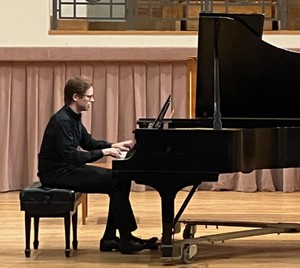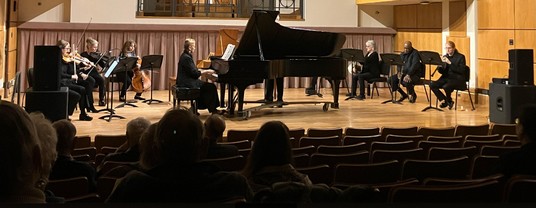
| Sour Cream |
ReviewsEverybody's talking about Pop's music! In their 55th season opener, Pop, the Norfolk Chamber Consort gave a delightful showcase of music by and related to "Papa Haydn." the influential composer and keyboardist with whom practically everyone in Europe crossed paths during his long life. Joseph Haydn lived and worked during a time where the world of keyboard instruments was a hotbed of innovations and experimental ideas. Standardizations such as the size, number of keys, functionality of pedals and couplers, tone, and sound production were all widely varied across different manufacturers, who, at the time, dealt with not only the new kid on the block - the fortepiano, with its expressive dynamic range - but also harpsichords, clavichords, and organs, each with their distinct coloristic flavors as well. It seemed there was a different keyboard instrument for every occasion! And that's what the Consort explored in their Haydn-centered program on October 23 - giving our modern audience an experience not of the stuffy, uptight stereotype of "Classical" era music but what was, in actuality, closer to a Wild West of instruments and innovations. On the stage were a harpsichord and a modern piano, the small, plain harpsichord dwarfed by the massive Steinway. Towering above them both was ODU's pipe organ, newly relocated to the alcove above the stage in the Chandler Recital Hall. The star of the show, Oksana Lutsyshyn, moved from harpsichord to organ to piano (and back again!) throughout the concert, showcasing her mastery of each of these instruments and their playing techniques. To open the concert, NCC's artistic co-director Andrey Kasparov treated the audience to an elegant rendition of Haydn's Piano Sonata in E major Hob XVI: 31, full of classical wit and charm. 
From the Classical Haydn, we went to his older Baroque contemporary Handel, this time by Lutsyshyn on harpsichord. The Passacaglia from Handel's Suite de pičce reminded me that humans have been enjoying certain favorite chord progressions for more than 300 years. The difference between then and now is that, in a Baroque passacaglia, composers would add layers of improvisatory material on top of a repeated chordal framework to continually transform the piece. The passacaglia gained an almost meditative quality as the deceptively simple harmonies began to take root, and the listeners bore witness to Lutsyshyn adding layer after layer of ornamentation and flair, transforming what was a bare patch of ground into an exquisite garden.  Kasparov joined Lutsyshyn at the piano as the Invencia Piano Duo for a performance of the famous Marche Militaire No. 1 by Schubert, another Haydn contemporary. The percussive rhythms and sforzandi accents were brought to life with crisp military precision by the husband and wife duo. It's always a showstopping performance when Invencia takes the stage. How wonderful to see these fine musicians together in their element once more. The program continued with Kasparov performing perhaps Haydn's most famous tune, his variations on Gott erhalte Franz den Kaiser for piano. This stately melody was a personal favorite of Haydn's, and it has truly embedded itself into the global consciousness over the past 220 years through countless classical variations, national anthems, school alma maters, and hymns. A program of Haydn could hardly be called complete without including something by "Pop's annoying student," * Ludwig van Beethoven, who studied with the famous composer for a time. Haydn, perhaps too preoccupied with his own commissions to give the young Beethoven his full attention, nevertheless instructed the young man in the fundamentals of composition, counterpoint, and harmony - a foundation from which the headstrong Beethoven would develop his own unique style and eventually garner fame of his own. Lutsyshyn returned to the harpsichord to perform an early piece Beethoven wrote while studying with Haydn, Six variations on "Nel cor piů non mi sento" from Paisiello's opera La Molinara. For listeners familiar with music of Beethoven, this early set of variations sounds like "Ludwig-Lite": still grounded in Classical tendencies and certainly before the drama of the Sturm und Drang of Beethoven's later works. 
Ending the first half of the program was the Sonata in B flat Major K. 570 by Wolfgang "All things considered, in Pop's estimation, the best composer" * Mozart, performed by Zachary Deak. A recent transplant to Hampton Roads from California, Deak is the new Director of Keyboard Studies and Assistant Professor of Piano and Musicology at ODU. Deak gave a bright and refined performance, from the highs of the cheerful Allegro to the somber soliloquies of the thoughtful Adagio. The second half of the concert opened with Lutsyshyn seated at the pipe organ centered above the stage in the balcony, where she performed two pieces from Joseph Haydn's younger brother Michael Haydn's set of Cadenze e versetti, MH 176. While certainly in his older brother Joseph's shadow, Michael Haydn was a talented composer in his own right.  The finale was a keyboard tour de force with Papa Haydn's Concerto in D major Hob. XVIII:11. Soloist Lutsyshyn and Conductor Brian Walden led an eight-piece chamber ensemble plus keyboard in the three-movement work, with one catch - Lutsyshyn would perform each movement on a different keyboard instrument! The talented ensemble was: Gretchen Loyola and Anna Dobrzyn, violins; Anastasia Migliozzi, viola; Elizabeth Richards, cello; Andrew Leoboldt and Harvey Stokes, oboe; and Ellen Polachek and Christine Foust, French horns. This was grand chamber music at its finest. And a unique experience to be sure! I don't think I've ever been more curious to hear what the next movement sounded like in a concerto - and yet the concert hall waited with baited breath both times the soloist walked to the next instrument - waiting for the reveal of the new set of colors with which Lutsyshyn would paint the musical canvas. NCC's next program will be "Poulenc and Prince Igor" on December 4 at 7:30 pm in the Chandler Recital Hall. Here's to the start to a wonderful 55th Season! *From NCC's witty program listings.
Norfolk Chamber Consort's third concert of the season, titled Sour Cream, offered music by Eastern European composers: Chopin, Liszt, Dvořák, and five compositions by Bedřich Smetana. Smetana (1824-1884) is regarded as the founder of Czech classical music but his music is little known and rarely performed, certainly not in Tidewater Virginia. Andrey Kasparov opened the program by playing two mazurkas by Fryderyk Chopin (1810-1849). Today we think of Chopin's music only as concert pieces but when Chopin composed them they were popular music written for dance halls and private parties at home. In 1844 Chopin was busy composing for the sheet-music industry. The industrial revolution was in full flower and mass production of pianos was filling living rooms of upper class homes all over Europe and America. The mazurka was a dance form that was very popular and Chopin, a terrific composer, became a celebrity. The dramatic piano opening of C Major, Op. 56 No. 2 (1844) played by Kasparov was followed by the Mazurka in C-sharp Minor that Adelaide Coles describes as "forlorn, amorous and mesmerizing with a sudden impassioned coda." No matter how lively you danced in Chopin's day, the shorter-than-two-minutes pieces would not have left you out of breath. Pianist Oksana Lutsyshyn then played the first Smetana piece, Bagatelles et Impromptus (1844) written when he was in his twentieth year. Here we encountered six pieces with simple, one-word titles; in translation: innocence, discouragement, idyll, desire, and love. The flow of notes offered warm, energetic, friendly energy, some of it introspective. The superb playing continued in Five Hungarian Folksongs (1873) by Franz Liszt (1811-1886). The program booklet printed the poetry from the folk material about the depth of love Liszt was attempting to capture in his music. The second Smetana piece from his From My Homeland (1879-1880) is one of the few pieces he wrote for violin and piano. A rush of piano notes opened, played by Lutsyshyn who was joined by Jonathan Richard's high notes on violin. For Smetana, thoughts of his fatherland conjured up feelings of love, joy, melancholy, disappointment and sorrow, heroism, bravery and nobility and both hope and despair. So many moods and emotions than could actually be contained within a single work. After intermission the program offered more engaging material for art song aficionados. Soprano Anna Feucht, with Lutsyshyn at the piano, sang two opera arias. The first was by Smetana from his opera The Bartered Bride (1866-70). Mařenka is in love with a poor man while the marriage broker promotes the son of a wealthy man. In Mařenka's Aria she sings about the confused messages she is dealing with while holding on to her dream of love. Text and translation were in the program. Singing in the original Czech language with a marvelous, powerful voice, Ms. Feucht captured the disbelief and pain of the young lover. The Bartered Bride has a good outcome: It turns out that Mařenka's beloved is also the wealthy man's son (but by a previous marriage and unfamiliar). He tricked the marriage broker into paying the other son to drop out but left in the clause that only the father's son could be the bridegroom. In the end the clever lover got his money, his birthright and his beloved. This was followed by the much loved Song to the Moon by Antonín Dvořák (1841-1904) from his opera Rusalka (1901). Such a lovely sound with bell-like piano notes that underline the text, "Tell him silver moon, that I am embracing him - at least momentarily." Almost spoken lines are intimately delivered before the stratospheric notes fly. Smetana's Five Waltzes (1844) were played by Invencia Piano Duo (Kasparov & Lutsyshyn). The A-flat Major second Waltz, a happy, even flippant piece, was followed by the E-flat Major Waltz that is somber, fast, even glossy four-hand pianism. The final A-flat Major Waltz had music box delicacy and ended with a powerful closing. Together from the first notes, flutist Wayla Chambo and Lutsyshyn on piano, played Pièces Romantiques, Op. 75 (1887) by Dvořák in a contemporary arrangement by Canadian saxophonist Jacques Larocque (b. 1945). The music unfolded like swaying in a sweet breeze. The majestic, bright, lively second movement had short flute breaths. The Allegro appassionato third offered deep feelings. The Larghetto fourth, with its ethereal pace, was the breath of a dream. Invencia returned to close the program with Smetana's Má vlast (My Country) (1872-1879) in an arrangement by Smetana. The titles of the sections appeared in the program in Czech and English: The first spring of the Vlatava River, forest hunt, country wedding (a dance tune), moon: swarm of mermaids, and four more. Moon: swarm of mermaids had a sound like beams of pale light. The high notes of the piano evoked the sound of struck slate; a deliberate flow evoked river water movement; cliffs of rocks were in the sound. A richness of complexity built to a climax of two abrupt, dramatic piano chords and it was over. The program gave good reason to hear Smetana's music. The freshness and strength led to the popularity he has had in the former Czechoslovakia. The title of the program is a take on the meaning of smetana in Russian: sour cream. Sour cream in Czech is zakysaná smetana. As former NCC President Larry Epplein told us: "With the borscht [Russian beet soup] you need a little smetana." Both Kasparov and Lutsyshyn grew up in the Soviet Union and attended Moscow Conservatory so they would know! Back to Top
|